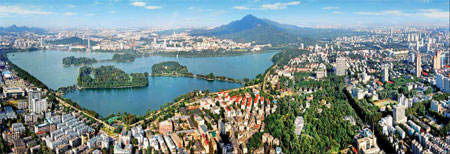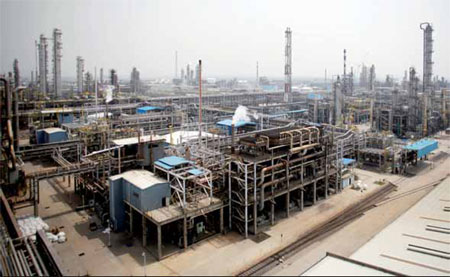
The ancient capital of Nanjing builds on historic strengths to position itself as location for overseas investment
The roads are being widened, the airport is being expanded, and public services are being improved - there is a lot going on in Nanjing, "the capital of six dynasties" whose history dates back to the 5th century BC. Now, as the capital of Jiangsu province, the ancient city wants to spread its influence in modern ways. It seeks to upgrade its economy at a time when more developed regions such as Shanghai are losing labor and investors to inland areas.
"There are a lot things going on nowadays in this city, and we see more companies from Europe coming here, or who are very interested in this city," says Patricia Enzmann, general manager of the Nanjing office of the European Union Chamber of Commerce in China.
There are 11,783 projects in Nanjing with a total investment of $32.4 billion (25 billion euros) from 2,960 overseas companies, the local government said.
Located in one of the most prosperous economic hubs in China - the Yangtze River Delta, with Shanghai at its center - Nanjing is developing vigorously. Remarkable growth is taking place not only in traditional sectors such as electronics and petrochemicals, represented by Ericsson, Siemens and German chemical giant BASF, but also in high-end services and other fields.
"Regarding places for investment, no doubt Shanghai is always top of the list, but Nanjing is very competitive among the second-tier cities," says Wu Zhe, administrative director of Nanjing's investment promotion commission.
|

Top: A bird's eye view of Nanjing, which has attracted 2,960 overseas companies with a total investment of $32.4 billion. Above: The production facility of BASF's joint venture with Yangtze Petrochemical Co in Nanjing. [Photos Provided to China Daily]
|
The old "southern capital" has some of the best education resources in the country, as home to more than 50 universities and colleges, and about 500 research and development centers.
It is also located close to Shanghai, where many multinational companies have headquarters, close to manufacturing cities such as Suzhou, and to undeveloped regions in Jiangsu and Anhui provinces, where there are rich labor resources, Wu says.
The operations of LG Electronics and Sharp in Nanjing make it the biggest manufacturing base for liquid crystal modules in the world. And the joint venture of BASF and Yangtze Petrochemical Company has made it the strongest player in that field.
One of Nanjing's biggest advantages, adds Wu, lies in its land supply. According to an investment environment report prepared by PwC, the cost of industrial land-use rights in Nanjing is lower than average.
As for factory construction costs, in Nanjing's Jiangning development zone it was 1,800 yuan ($285, 220 euros) per square meter in 2010, a third of the cost in Shanghai's Minhang district and 350 yuan lower than that in Hangzhou, Zhejiang province, the PwC report said.
|


